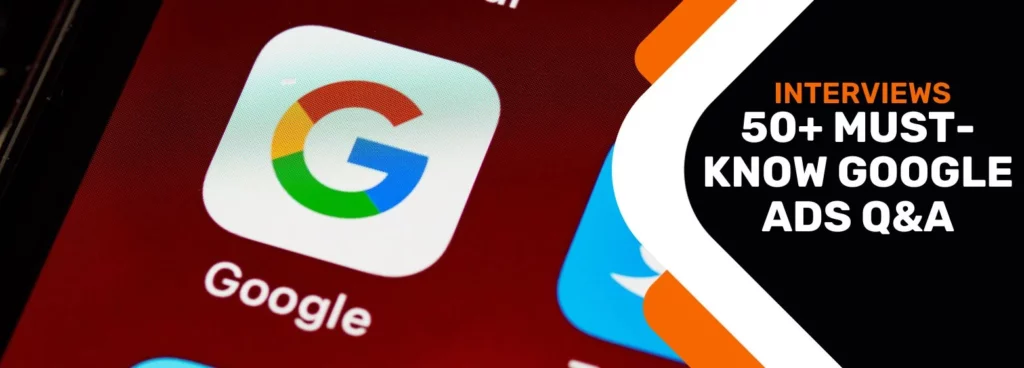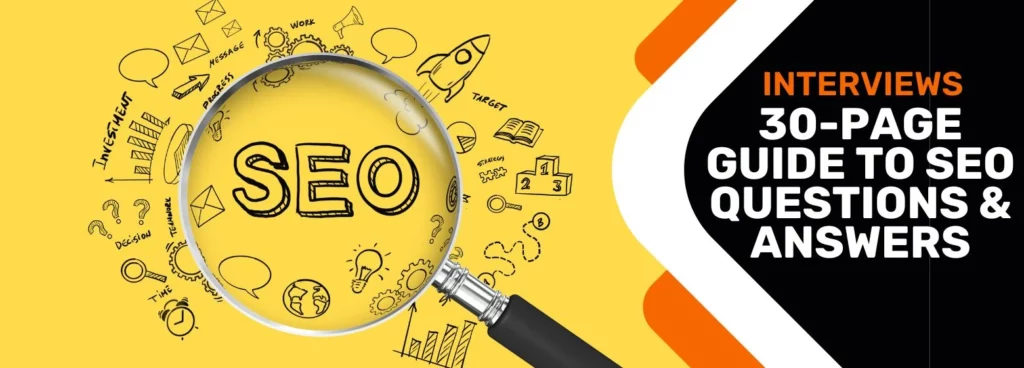What’s The Difference Between a CV and a Resume? A Guide with Examples for IT Professionals
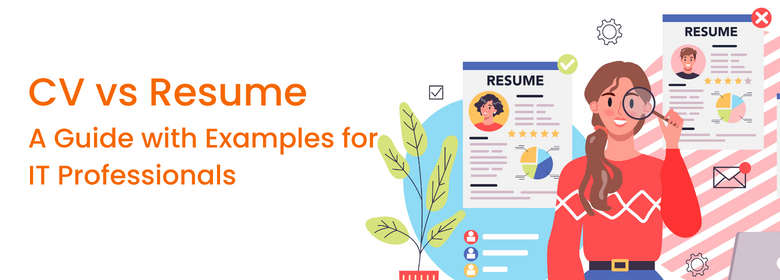
Your CV or Resume is the first step to landing your dream job. CVs and resumes are often compared when deciding what to attach to your job application. Creating a CV or Resume for desired high competitive tech jobs can be challenging for you. Choosing the right CV and Resume is the first step to overcoming this hurdle.
If you're not sure how a CV differs from a resume, read this article for all the answers to your questions.
1. What is a CV?
2. What is Resume?
3. CV vs Resume: Four Difference Factors
- What must be included in CV or Resume
- How you should write a CV or Resume
- When you should use a CV or Resume
- International Difference CV and Resume
4. Final Thought
1. What is a CV?
CV stands for “Curriculum Vitae”, a Latin word that means “the course of your life.” The CV meaning is to put detailed information about your education, expertise, skills, careers, awards, achievements, and scholarships in one document.
It can be summarised in one line: "Your CV describes your educational and career journey." As the journey continues, it's crucial to update it as soon as you gain new experiences and skills. Thus, a CV does not have a page limit. You can make a CV anywhere between 2 and unlimited pages.
Example cum sample
Check out the following data scientist CV example. The candidate, Jack Simmons, has explained his data scientist experience concisely. Besides, he has also highlighted his technical skills along with his level of expertise in each skill.
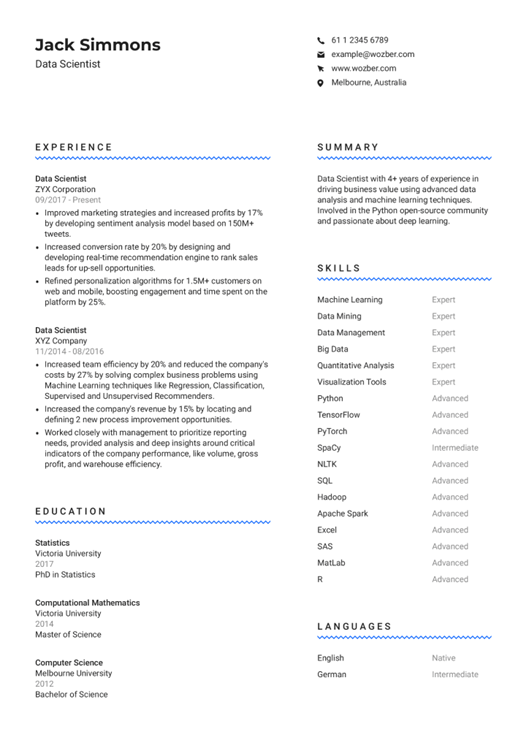
Interested in Data Science interview questions?
CV Types
You can create three types of CV:
- Chronological CV – A standard CV to showcase your education and work experience chronologically.
- Functional CV – A CV type that highlights your skills and experience rather than showing them in order.
- Combination CV – This CV type is a combination of both: chronological and functional.
2. What is Resume?
You list your education, competencies, and work experience in a resume. The word’s origin is French and it means “to sum up.” Thus, you should summarise your expertise and knowledge to write a compelling resume.
The development of technologies every day opens up new job opportunities. Landing a job in the tech industry is possible if you follow the proper process and tools. You can outsmart the ATS system and get an invitation to an interview by preparing a compelling resume.
You don’t need to put everything in chronological order like a CV. Based on the job requirements listed, you should be focusing on the essential mastery and abilities. Ideally, you create a straight-to-point document with your professional achievements.
Example cum sample
Check out the following resume example of a “Computer Scientist.” You can see how that person has highlighted his professional proficiency and technical talents than education.
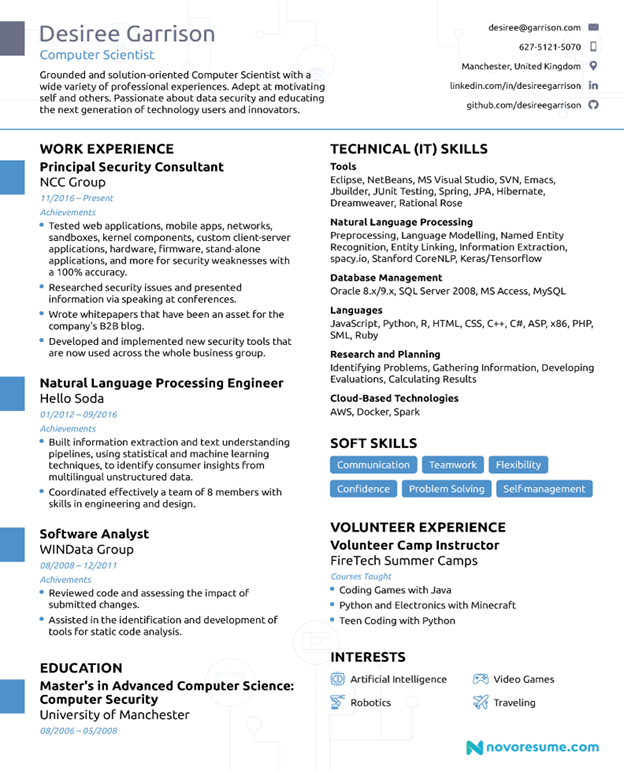
Resume Types
Similarly to a CV, a resume has 3 standard types. Besides, you can create a Targeted resume:
- Chronological Resume – A standard resume type to showcase your work workfare in descending chronological order.
- Functional Resume – A resume type that also prioritises your abilities, talents and workfare, including career gaps.
- Combination Resume – This resume type combines a chronological and functional resume.
- Targeted Resume – A customised resume type designed for a specific job opening to highlight relevant abilities and experience.
3. CV vs Resume: Four Difference Factors
It is a common mistake for a candidate applying for a technical role to submit a resume instead of a CV. That’s why it is essential to understand the difference between both. To make a CV different from a resume, consider the following factors.
1. What must be included in a CV or Resume
A CV should comprise:
- Full name
- Contact information
- Personal statement (professional background, professional title, career objective)
- Education
- Work Experience
- Skills
- Achievements and Awards
- Certificates & Publications
- Professional Courses & Training
- Research & Fellowships
- Languages
- References
A resume will require:
- Full name
- Contact information
- About you
- Career objective
- Education qualifications
- Work Experience
- Professional Skills
- Achievement and extra curriculum activities
- Languages & proficiency
- General information (hobby or interests)
2. How you should write a CV or Resume
You are more likely to be noticed by hiring managers if you have a stellar CV or resume in the first place. Keep all these factors in mind when designing your CV or resume.
CV
- Take some CV builders' help to make a simple but navigational CV.
- You can keep the length of CV pages to more than 1-2 based on your acquired qualification and expertise.
- Choose the right CV type and format depending on the job you are applying for. If you have no work experience, you should use a functional CV. You can find more examples here.
- Start CV with your personal and educational information and then put other details.
- Present your qualifications and experiences relevant to jobs.
Resume
- Take the help of some resume builders to make a concise and straightforward resume.
- Keep the resume length to a maximum of 2 pages.
- Choose the right resume type and format depending on your job search. Consider using chronological type if you have solid expertise in your field. See more examples here.
- Do your homework and get some information about recruiters and available positions. What are they looking for in particular? Try to include that in the resume.
- You must emphasise skills more than academic qualifications.
Considering career switch to engineering manager?
3. When you should use a CV or Resume
When you submit an application, you always feel anxious about getting short-listed. Consider the following points to ensure your application is the best it can be:
- You must submit your CV if you're applying for academic or research jobs that require nerdy and fact-finding capabilities. These jobs usually require complete education qualifications, work experience, and other academic achievements.
- You will need a resume if you apply for corporate jobs in the tech sector (non-academic, non-research jobs). These jobs focus on your professional and soft skills, language proficiency, and professional experience. These attributes are easy to describe in a resume, and HR can select applicants based on job roles.
Apply for a job and check if your resume is a good match.
4. International Difference CV and Resume
In the tech and software industries, technology expansion and globalisation create job opportunities. Most technology companies are looking to outsource team member resources across borders as part of their global expansion. You can apply for a remote job at an international company without moving abroad.
The application requirements vary from country to country. When applying for jobs in any MNC, you should keep these points in mind:
- Employers in the UK prefer the term CV over resume. If you are applying for academic positions in Europe, you can use the term academic CV. If you are looking for jobs in European countries, you should have a CV.
- The word "resume" is frequently used in the U.S. and Canada. Therefore, you should use a resume when applying for a job.
- In Australia, both “CV” and “resume” are used to apply for a job. Any Australian company can accept either one.
In doubt, you can always contact the company's hiring managers to clarify whether you need to submit a resume or CV.
Wondering when to quit your job?
4. Final Thought
Are you aware that recruiters only spend 6 to 7 seconds screening CVs and Resume? In general, a job profile receives 300 applications, and 88% of them are rejected. We are sure that the submission process is completed correctly. The problem is that the resume is sent when a CV is needed and vice versa.
While applying for the desired job, you have to make the right choice of CV or resume. Thus, optimise your resume, find companies on our site, and apply for the job of your dreams.
To get more tips on preparing for technical interviews, join our Hackertrail community.
Backend Technology Interview Questions
C Programming Language Interview Questions | PHP Interview Questions | .NET Core Interview Questions | NumPy Interview Questions | API Interview Questions | FastAPI Python Web Framework | Java Exception Handling Interview Questions | OOPs Interview Questions and Answers | Java Collections Interview Questions | System Design Interview Questions | Data Structure Concepts | Node.js Interview Questions | Django Interview Questions | React Interview Questions | Microservices Interview Questions | Key Backend Development Skills | Data Science Interview Questions | Python Interview Questions | Java Spring Framework Interview Questions | Spring Boot Interview Questions.
Frontend Technology Interview Questions
HTML Interview Questions | Angular Interview Questions | JavaScript Interview Questions | CSS Interview Questions.
Database Interview Questions
SQL Interview Questions | PostgreSQL Interview Questions | MongoDB Interview Questions | MySQL Interview Questions | DBMS Interview Questions.
Cloud Interview Questions
AWS Lambda Interview Questions | Azure Interview Questions | Cloud Computing Interview Questions | AWS Interview Questions.
Quality Assurance Interview Questions
Moving from Manual Testing to Automated Testing | Selenium Interview Questions | Automation Testing Interview Questions.
DevOps and Cyber Security Interview Questions
DevOps Interview Questions | How to Prevent Cyber Security Attacks | Guide to Ethical Hacking | Network Security Interview Questions.
Design Product Interview Questions
Product Manager Interview Questions | UX Designer Interview Questions.
Interview Preparation Tips
Strength and Weakness Interview Questions | I Accepted a Job Offer But Got Another Interview | Preparation Tips For the Virtual Technical Interview | 7 Tips to Improve Your GitHub Profile to Land a Job | Software Engineer Career Opportunities in Singapore | What can you expect during a whiteboard interview | How To Write A Resignation Letter | Recommendation Letter Templates and Tips.
Quick Links
Practice Skills | Best Tech Recruitment Agency in Singapore, India | Graduate Hiring | HackerTrail Litmus | Scout - Sourcing Top Tech Talent in ONE Minute | About HackerTrail | Careers | Job Openings.



